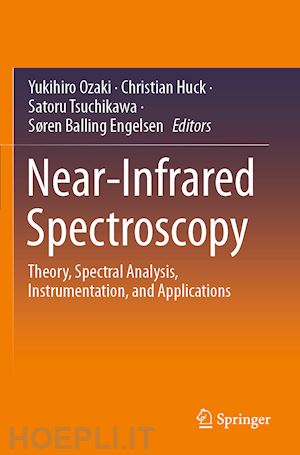
Questo prodotto usufruisce delle SPEDIZIONI GRATIS
selezionando l'opzione Corriere Veloce in fase di ordine.
Pagabile anche con Carta della cultura giovani e del merito, 18App Bonus Cultura e Carta del Docente
Yukihiro Ozaki received his PhD from Osaka University in 1978. His research interest includes basic studies and applications of NIR, IR, Raman, FUV and Terahertz spectroscopy. He is currently professor emeritus of Kwansei Gakuin University. He published many books; for example, S. Sasic and Y. Ozaki ed.: Raman, Infrared, and Near-Infrared Chemical Imaging, John Wiley & Sons (2010). Y. Ozaki, K. Kneipp, and R. Aroca eds.: Frontiers of Surface-Enhanced Raman Scattering : Single Nanoparticles and Single Cells, Wiley (2014). Y. Ozaki and S. Kawata eds.: Far- and Deep-Ultraviolet Spectroscopy, Springer (2015). K. Kneipp, Y. Ozaki and Z.-Q. Tian, eds.: 45 years enhanced Raman signals - recent developments in plasmon supported Raman spectroscopy, World Scientific, in press (2017). M. Wojcik, B. Kirtman, H. Nakatsuji, Y. Ozaki, eds.: Frontiers of Quantum Chemistry, Springer (2017). He won the Tomas Hirschfeld Award (1998), EAS Award in Achievement in Near-Infrared Spectroscopy(2001), Gerald S. Birth Award (2006), Bomem-Michelson Award (2014). The Chemical Society of Japan Award (2017), The Medal with Purple Ribbon (2018), Pittsburgh Spectroscopy Award (2019). He has about 35 years of teaching experience.
Christian W. Huck received his PhD from Innsbruck University in 1998 and received his habilitation in 2006. In 2014 he received a call to the University of Stuttgart. In 2016 he followed a call to the University of Innsbruck where he currently holds the position of a full professor for analytical chemistry. His research interest includes vibrational spectroscopy with main focus on NIR, Chemometrics and other analytical techniques and was the receiver of Tomas Hirschfeld award (THA) in 2018.
Satoru Tsuchikawa received his PhD from Nagoya University in 1998. His research interest includes applications of NIR, IR, and Terahertz spectroscopy to agricultural and wood sciences. He published more than 120 peer reviewed papers andseveral books; for example, S. Tsuchikawa ed.: Useful and Advanced Information in the Field of Near Infrared Spectroscopy, Research Signpost (2004). D. D. Stokke, D. D., L. H. Groom eds.: Characterization of the Cellulosic Cell Wall, Blackwell Publishing (2006). Y. Ozaki, W. F. McClure, and A. A. Christy: Near-Infrared Spectroscopy in Food Science and Technology, Wiley-Interscience, New York (2007). He won several awards, including the Buchi NIR Award (2003), the PerkinElmer Award (2003), and Tomas Hirschfeld Award (2017), Gerald S. Birth Award (2018). He has about 25 years of teaching experience.
Søren Balling Engelsen received his PhD in Molecular Modelling from The Technical University of Denmark back in 1992. He is currently professor of Biospectroscopy at University of Copenhagen. His research interest includes development and application of high-throughput quantitative spectroscopic methods (NIR, IR, Raman and NMR) for food and biological samplesin quality control, process analytics, foodomics and metabolomics. A key issue in this line of research is the development of multivariate chemometric methods (exploration, regression and classification) for optimal spectral information extraction. He has published more than 260 publications in peer reviewed scientific journals. He chaired the 18th International Conference on Near Infrared Spectroscopy, ICNIRS 2017, in Copenhagen. He received the Tomas Hirschfeld Award in 2015 and was knighted by the Queen of Denmark in 2018. He has about 25 years of teaching experience and has been main responsible for the supervision of more than 35 PhD students .











Il sito utilizza cookie ed altri strumenti di tracciamento che raccolgono informazioni dal dispositivo dell’utente. Oltre ai cookie tecnici ed analitici aggregati, strettamente necessari per il funzionamento di questo sito web, previo consenso dell’utente possono essere installati cookie di profilazione e marketing e cookie dei social media. Cliccando su “Accetto tutti i cookie” saranno attivate tutte le categorie di cookie. Per accettare solo deterninate categorie di cookie, cliccare invece su “Impostazioni cookie”. Chiudendo il banner o continuando a navigare saranno installati solo cookie tecnici. Per maggiori dettagli, consultare la Cookie Policy.